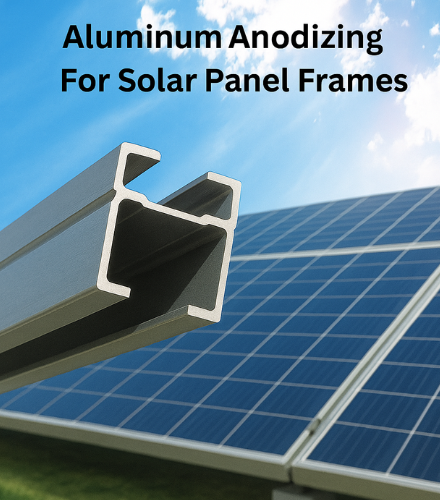Solar energy is revolutionizing the global power landscape — and at the heart of every photovoltaic (PV) system lies a framework of engineered materials designed for efficiency, durability, and sustainability. One such critical component is the solar module frame, often made from aluminium. But not just any aluminium — anodized aluminium is the industry standard.
This blog dives deep into why anodizing is essential for solar PV module frames, highlighting the key applications, technical advantages, and the science behind why anodized aluminium frames outperform untreated or coated alternatives.
Understanding the Role of Solar PV Module Frames
A solar PV module frame serves as the structural boundary for the solar panel. It provides:
- Mechanical strength and rigidity
- Mounting support for installation
- Environmental protection against wind, snow, rain, and dust
Given that these frames are constantly exposed to UV radiation, moisture, fluctuating temperatures, and potentially corrosive environments (especially in coastal areas), the material used must be both lightweight and extremely resilient. That’s where anodized aluminium comes in.
What Is Anodizing?
Anodizing is an electrochemical process that thickens the natural oxide layer on aluminium. This added layer:
- Prevents corrosion and oxidation
- Increases surface hardness
- Enhances wear resistance
- Provides an attractive and consistent finish
This coating is an integrated part of the metal itself, making it more durable and long-lasting than painted or powder-coated aluminium in outdoor applications.
Key Benefits of Anodizing for Solar Panel Frames
1. Corrosion Resistance
Solar panels are exposed to extreme weather: salty air in coastal regions, acid rain, snow, and high humidity. Anodized aluminium provides a non-reactive oxide layer that resists rust and degradation over decades.
2. Structural Integrity
Anodizing increases the surface hardness of aluminium, making it more resistant to scratches, dents, and mechanical impact — ensuring the solar frame maintains its form and strength for years or even decades.
3. UV and Weather Resistance
Unlike paint or coating, anodizing does not peel, chip, or fade under UV exposure. This ensures that the solar frame maintains both appearance and function throughout its lifespan.
4. Thermal Conductivity
Aluminium already has good thermal conductivity. Anodizing doesn’t insulate or disrupt this feature — making it ideal for reducing thermal hotspots around the frame.
5. Lightweight Advantage
Anodized aluminium offers one of the best strength-to-weight ratios, essential for large installations on rooftops and solar farms where dead load must be minimized.
Real-World Applications in Solar Industry
- Frame thickness (e.g., 40mm): Anodized aluminium enables thinner frames with equivalent strength, optimizing material usage and aesthetics.
- Full-black panels: Many solar aesthetics trends (like full-black panels) use black anodized finishes, blending performance with visual appeal.
Mounting & Grounding: Anodized aluminium frames support both structural mounting and grounding requirements without compromising conductivity.
Environmental Benefits of Anodized Frames
As the solar industry promotes clean energy, the materials used should also follow green manufacturing principles. Fortunately, anodizing:
- Produces no VOCs or hazardous waste
- Requires minimal maintenance over product lifespan
- Keeps aluminium fully recyclable after use
The eco-friendliness of anodized aluminium aligns perfectly with the solar industry’s sustainability goals.
Why Aluminium (and Not Steel or Plastic)?
Steel
✔ Strong
❌ Heavy, rusts without coating
Plastic
✔ Lightweight
❌ Weak, brittle in UV exposure
Anodized Aluminium
✔ Strong ✔ Lightweight ✔ Rust-resistant ✔ UV-Stable
Conclusion: Anodized aluminium provides the perfect blend of mechanical and environmental resilience — a must for solar installations meant to last 25–30 years.
Final Thoughts
The anodizing of aluminium for solar PV module frames is essential. It transforms basic aluminium into a high-performance material that can endure the elements, offer long-term protection, and support the rising demands of solar infrastructure.
As the solar industry accelerates globally, adopting anodized aluminium frames ensures cost-effective, reliable, and sustainable solar energy solutions for the future.
FREQUENTLY ASKED QUESTIONS – FAQs
1. How can I get in touch with your team for Anodizing requirements?
You can contact us directly by emailing corporatecommunications@growel.com. Our team will be happy to assist you with your specific requirements, technical questions, or service inquiries.
2. Is there any inquiry form that I need to fill out?
Please visit our Anodizing Solutions page. Scroll to the bottom of the page — you’ll find a simple inquiry form there. Kindly fill it out, and our team will contact you shortly to assist with your requirements.
3. Is there a support email if I have questions about the website or technical issues?
Yes! For any queries related to Anodizing, please reach out to corporatecommunications@growel.com. We’ll ensure your query is resolved promptly.



